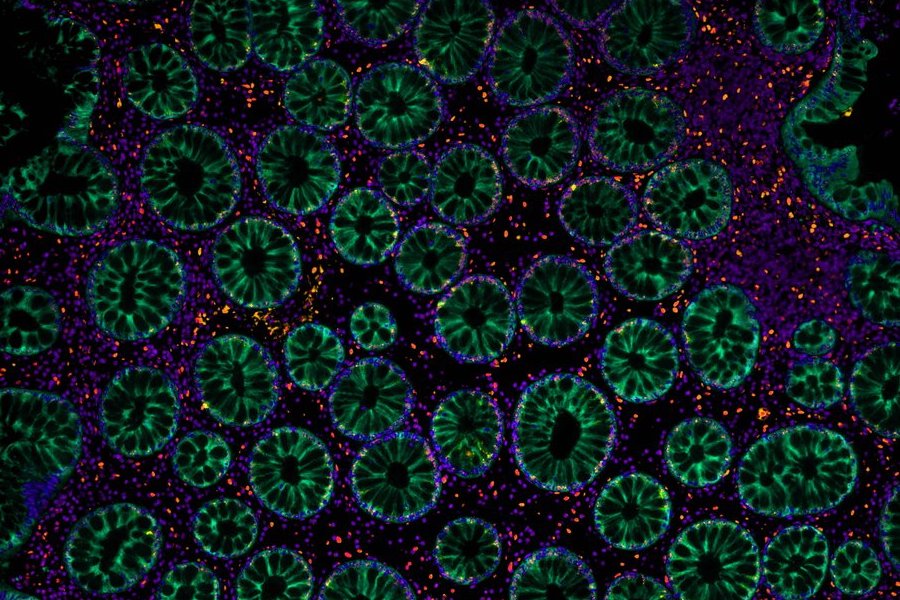Colorectal cancer is the third most common and fourth deadliest type of cancer in the world. The high mortality rate is because this cancer is often not detected until the tumor has already metastasized and spread, at which point the available therapies (including surgery, radio- and chemotherapy and even immunotherapy) are usually ineffective. Though there are some genetic factors that increase the risk of colorectal cancer, the majority of cases are linked with lifestyle factors such as diet, obesity, smoking and alcohol and a lack of exercise.
The disease originates from the epithelial cells that line the intestines. These ‘barrier’ cells accumulate mutations which typically turn into a benign tumor in the form of a polyp and then acquire more malignant properties over time. The cancerous cells then spread to the rest of the body. As treatments often fail at this late stage of the disease, it is imperative that we gain a better understanding of the early stages and the drivers causing the epithelial cell mutations in the first place. A better understanding of the molecular mechanisms responsible for colorectal cancer development is needed for us to develop new therapies to effectively combat this deadly disease.
Malfunctioning protein allows microbes to invade
In a paper recently published in the leading journal Nature Cancer, a collaboration between the research groups of Prof. Geert van Loo, Prof. Lars Vereecke, and Prof. Geert Berx identified the protein Zeb2 as a possible cause of colorectal cancer. They showed that the abnormal expression of this protein in the epithelial cells of the gut in mice can induce colorectal cancer. Prof. Geert Berx explains:
“We study the molecular mechanisms that regulate tissue invasion and metastasis in various types of cancer. We knew Zeb2 regulates a molecular process which allows cancer cells to acquire tissue-invasive properties, resulting in malignant disease progression. By using transgenic mice expressing Zeb2, we can study this process in multiple tissues, including the intestine. This study demonstrates that Zeb2 reprograms the epithelial cells of the intestinal wall, which allows bacteria to pass and cause inflammation that can lead to tumor development.”
These findings demonstrate that complex immune-microbiota interactions contribute strongly to colorectal cancer development. – Prof. Lars Vereecke, VIB-UGent/CRIG
Importantly, this study also found that by treating mice with broad-spectrum antibiotics to kill intestinal bacteria, or by raising mice in complete sterile conditions, cancer development could be completely prevented. Prof. Lars Vereecke elaborated:
“There is increasing evidence that the microbes in our gut play a central role in human health and disease. Many diseases are associated with distinct shifts in the microbiota-composition, including colorectal cancer. Proving that the microbiota contribute to disease requires functional studies in mice.
Recently, we established the first Belgian germ-free mouse facility at Ghent University where we raise mice in completely sterile conditions. Using this new technology, we could prove that removing the intestinal microbes prevents colorectal cancer development in our model. Moreover, by modulating the activity of specific immune cells we could also suppress cancer development. Together, these findings demonstrate that complex immune-microbiota interactions contribute strongly to colorectal cancer development.”
New avenues for cancer prevention
The new Zeb2 mouse model represents a unique tool for studying the interactions between cancer, the immune system and our microbiome. Understanding this complex relationship is opening up new possibilities in the search for effective therapies targeting colorectal cancer.
Our results are important from a scientific point of view since they help us understand why and how colorectal cancer develops. But this knowledge also has therapeutic implications. – Prof. Geert van Loo, VIB-UGent/CRIG
Since cancer development in the mice is microbiome-dependent, these germ-free Zeb2 mice represent a unique preclinical platform for microbiome research. This is true not only for identifying cancer-promoting microbes, but also for testing new microbiome-based therapies to prevent or treat colorectal cancer. Prof. Geert van Loo concludes:
“We identified a disease-causing mechanism using a new mouse model but also confirmed abnormal Zeb2 expression in human colorectal tumor cells, which proves the clinical significance of our model for human patients.
Read this previous BioVox article for more on the link between sugar and cancer.
Our results are important from a scientific point of view since they help us understand why and how colorectal cancer develops. But this knowledge also has therapeutic implications and suggests that altering the microbiota or targeting specific immune components may be effective strategies for developing new treatment options for colon cancer.”
Header Image: Human intestinal cells from a colorectal cancer biopsy showing ZEB2 expression. From the colorectal cancer paper and featured on the cover of the Nature Cancer.


